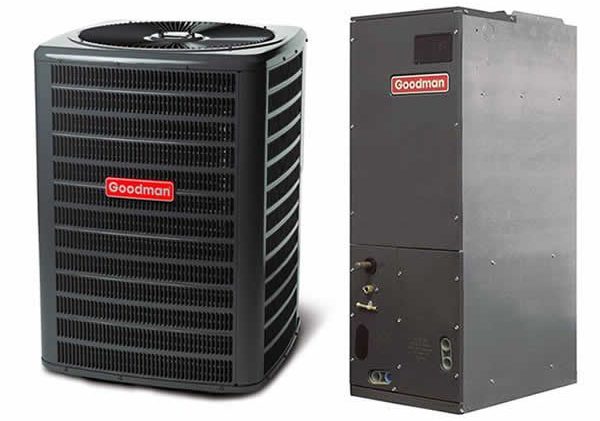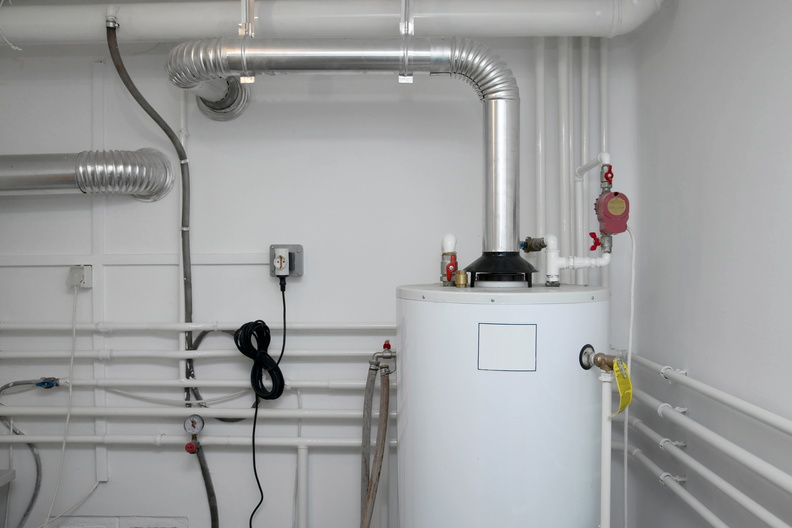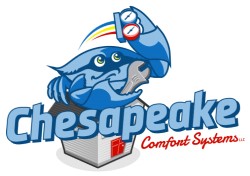
The Pros and Cons of Common Heating Systems
When considering a new heating system, finding an option that best fits your home and budget can feel overwhelming. With so many options to choose from, having a clear vision of what is most important to you can be a great place to start. Do you value energy efficiency the most? Cost-effectiveness? Multi-functionality? Whatever it is, rest assured that with a little research, and professional guidance from your trusted local HVAC contractor, you will find the perfect heating system to meet your needs.
To help you make the best decision, we’ve compiled a list of the most common heating systems available and the pros and cons associated with each.
1. Heat Pumps

Standard air-source heat pumps are an excellent multi-functional option. They not only have the ability to heat your home, but also provide air conditioning. Heat pumps consist of two main components: an indoor air handler and an outdoor unit very similar to a central air conditioner, but referred to as a heat pump. The outdoor unit contains a compressor that circulates refrigerant which traps and releases heat as it travels between the indoor and outdoor units.
How Heat Pumps Work: When your thermostat detects a drop in temperature, or is manually programmed to a new temperature preference, it sends a signal to your heat pump to turn on. The outdoor unit first draws heat from the air and transfers the collected heat to the refrigeration coolant. Next, the coolant gets compressed, which boosts the temperature significantly, and moves on to the indoor unit. Finally, the indoor unit projects air over the hot coolant, and heats your home to the desired temperature through a series of air ducts. Similarly, heat pumps provide air conditioning by pulling the warm air out of your home, rather than using energy to cool air from outside.
There are also geothermal heat pumps which utilize the Earth’s heat and a series of water pipes to generate radiant heat, and ductless heat pumps which, well you guessed it, don’t require any ductwork— but more on those later.
Heat Pump Pros:
- Multi-functional
- Ability to provide heating and cooling which makes heat pumps a great multi-functional choice.
- Energy Efficient
- One of the most energy efficient heating and cooling options available, saving you energy costs in the long run. Heat pumps heat much more efficiently than traditional heaters, and come in a variety of high SEER (Seasonal Energy Efficiency Ratio) ratings.
- Great for Moderate Climates
- Heat pumps are a great choice for areas where temperatures generally stay above 40 degrees Fahrenheit. Heat pumps are still however a very popular system choice in Maryland, because they can be used in tandem with a gas or propane furnace— also known as a duel fuel system. Duel fuel systems utilize both a heat pump and a furnace for maximum system efficiency. In cold weather extremes, a duel fuel system turns off the heat pump and activates the furnace. When milder weather conditions return, it turns of the furnace, then switches back to the heat pump.
- Boosts Air Quality
- Heat pumps come equipped with humidity control. Too much or too little humidity can cause discomfort and negatively impact air quality. Luckily, heat pumps reduce indoor humidity with ease in the summer, and do not dry out indoor air nearly as much as other traditional heat sources such as gas heaters do in the winter.
Heat Pump Cons:
- Less Efficient in Cold Weather Extremes
- Once temperatures drop below 30 degrees Fahrenheit, an additional heat source will most likely be needed.
- Costly Installation
- The initial installation can be expensive in comparison to other heating systems, however if you are able to find an HVAC contractor that offers flexible financing such as Chesapeake Comfort Systems, the initial costs can certainly be offset.
- Require More Maintenance
- Heat pumps do require more maintenance than other heating systems, however this is mainly because they are used much more frequently than a heat-only system type, and have more working mechanical parts.
2. Forced-Air Furnaces

Furnaces operate with a central air system, which heats air in a one area and then distributes it throughout the home via a network of ductwork and vents. There are two primary categories for furnace types: gas or electric. Electric furnaces are unique because they can heat the air by exposing heated elements, while gas furnaces generally need some type of heat exchanger or chamber to warm the surrounding air.
How Furnaces Work: Triggered by the command of your home thermostat, a forced-air furnace first ignites and heats up an interior metal heat exchanger by fire while simultaneously expelling combustion gases via a flue pipe. The heat exchanger then transfers its heat to the incoming air, forces the heated air into your homes ductwork, and disperses the heat throughout. As heat enters each room, the cool air is recycled back into the furnace through return ducts and then repeats the process until the desired temperature is achieved.
Furnace Pros:
- Inexpensive to Install
- Furnaces, especially electric furnaces, are inexpensive to install in comparison to other kinds of systems. Plus, if an air conditioning system is already installed in your home with pre-existing ductwork, a furnace can share the same ductwork, which reduces installation costs.
- Long Life Expectancy
- With a life expectancy of 20-30 years, furnaces have the potential to last twice as long as other systems with proper care and maintenance.
- Prompt and Reliable Heating
- Furnaces really pack the biggest and fastest punch when it comes to heat. They are able to heat a home much faster than radiant heat systems or heat pumps, and are the best choice for areas that experience harsh winters regularly.
- Require Less Maintenance
- As mentioned previously, heat pumps not only heat your home but provide air conditioning as well. This means they get significantly more use. More use equals more maintenance. With a furnace, you’re only using it during the cooler months, which not only helps prolong it’s lifespan, but also reduces the amount of maintenance required.
Furnace Cons:
- They’re Expensive to Run
- Though furnaces cost less to install, they’re overall more expensive to run, especially if an electric furnace is chosen.
- Less Energy Efficient
- Furnaces require much more energy to run. To put things into perspective, a high-efficiency gas furnace is about 90 percent efficient. In comparison to a heat pump, which can transfer 300 percent more energy than it consumes.
- Potential Ductwork Issues
- It is common for ductwork to develop leaks and tears with age. This often happens without homeowners even realizing there is a problem, and in return could potentially end up costing you a small fortune just live comfortably in cooler months.
3. Boilers

Boilers are classified into two primary types: steam boilers and hot water boilers. Boilers produce warm air by using oil, gas, or electricity to heat up water inside a tank. Since a boiler system uses water to transfer heat, its temperature can be accurately controlled for more consistent heat with less variability in temperature. Boilers also make it easier to zone heat in different rooms of your home. With zoning, you can fine tune your temperature preferences and keep certain rooms such as your bedroom warmer then say, your living room.
How Boilers Work: When your homes thermostat detects a drop in temperature, or its settings get manually adjusted, the thermostat prompts your boiler to kick on. It then begins to heat water within its tank. Next, the heated water or steam is sent throughout the home via radiators or a radiant floor system. Finally, as the water cools, it travels back to the boiler and gets reheated, continuing the process until your home reaches the desired temperature.
Boiler Pros:
- Longer Lasting Heat
- When a furnace shuts off, warmth quickly disappears and drafts throughout the house can often be felt. Radiant heat from a boiler however, retains much more heat than a forced-air system such as a furnace or heat pump, and can radiate heat for up to 3 or even 4 hours after the system is shut off. This keeps your home consistently warm and cozy, which can be a really nice perk in chilly winter months.
- Virtually Silent Operation
- Forced-air systems can be noisy while circulating warm air through your home. Boilers on the other hand, are virtually silent, requiring no blower motors or other loud components.
- Improved Air Quality
- While you can argue that forced-air systems can improve air quality, if preventative maintenance is overseen or neglected, forced-air systems can spew allergens and debris all throughout your home including pet dander, dust, and mold. Yuck! With a boiler system, there is no system air movement, which naturally reduces the amount of potential debris floating throughout your home. There are also no air ducts to clean and maintain, which means fewer allergens in the air to purify.
Boiler Cons:
- Costly Installation
- The initial installation can be expensive in comparison to other heating systems due to their complexity, however if you are able to find an HVAC contractor that offers flexible financing such as Chesapeake Comfort Systems, the initial costs can certainly be offset.
- Slower to React
- Unlike a forced-air system, boilers are slow to react to thermostat changes. They require a bit more patience and time to heat, which can be frustrating and even uncomfortable at times.
- Potential Risk of Water Leaks
- If your boiler happens to leaks water, there is a chance your home could suffer from serious water damage.
4. Geothermal Systems

Similar to boilers, geothermal systems use radiant water to heat your home. Geothermal systems are an excellent environmentally friendly choice. Because they use renewable energy, there are no fossil fuels burned or harmful CO2 gases emitted. Geothermal HVAC systems use only the Earth’s temperature and electricity to produce heat or air conditioning for your home. Similar to a boiler, geothermal systems make it easier to zone heat in different rooms of your home.
How Geothermal Systems Work: As the sun heats the earth, heat is absorbed and transferred into water-filled underground pipes. Next, the water makes its way through a heat pump, which heats the air. Finally, the heat pump sends the heated air through a distribution system, until the desired temperature programmed via thermostat is reached. To cool your home, it essentially does the same thing in reverse, pulling hot air from your home and transferring it out using the same water-filled underground pipes.
Geothermal Pros:
- Multi-Functional
- Just like air-source heat pumps, geothermal heat pumps have the ability to heat and cool your home.
- Great For Any Climate
- Geothermal heat pumps can be used in any climate, no matter how hot or cold, because of the Earth’s constant underground temperature which ranges from 45° Fahrenheit to 75° Fahrenheit depending on location.
- Extremely Energy Efficient
- Geothermal systems can potentially pay for themselves in just five to seven years with up to 70% savings annually. They’re four times as efficient as a traditional HVAC system.
- Improved Air Quality
- While you can argue that forced-air systems can improve air quality, if preventative maintenance is overseen or neglected, forced-air systems can spew allergens and debris all throughout your home including pet dander, dust, and mold. With a geothermal system, there is no system air movement, which reduces the amount of potential debris floating throughout your home. There are also no air ducts to clean and maintain, which means fewer allergens in the air to purify.
Geothermal Cons:
- Costly Installation
- The initial installation can be very expensive in comparison to other heating systems due to geothermal systems’ complexity and underground components, however if you are able to find an HVAC contractor that offers flexible financing such as Chesapeake Comfort Systems, the initial costs can certainly be offset.
- Slower to React
- Similar to a boiler system, geothermal systems are slow to react to thermostat changes. They require a bit more patience and time to heat, which can be frustrating and even uncomfortable at times.
- Potential Risk of Water Leaks
- If your geothermal happens to leaks water, there is a chance your home could suffer from serious water damage.
5. Ductless Mini-Split / Wall Mount Heat Pumps

Mini-splits are heating and cooling systems that allow you to control the temperatures in individual rooms or spaces. Mini-split heat pumps are not only great solutions for whole home or new constructions but make good retrofit add-ons to houses with “non-ducted” heating systems, such as hydronic (hot water heat), radiant panels, and space heaters (wood, kerosene, propane). They can also be a good choice for room additions where extending or installing distribution ductwork is not possible, and energy efficient new homes that require only a small space conditioning system.
How Ductless Mini-Splits Work: Ductless mini-splits work very similarly to a standard air-source heat pump, but without the ducts. First, the outdoor unit draws heat from the air and then transfers the collected heat to the refrigeration coolant. Next, the coolant gets compressed, which boosts the temperature significantly, and then migrates to the indoor wall unit. Finally, the indoor wall unit projects air over the hot coolant, and heats to the desired temperature programmed on a thermostat. Rather than going through ducts however, the heat is dispersed directly from the indoor wall unit.
Ductless Mini-Split Pros:
- Multi-functional
- Ability to provide heating and cooling which makes heat pumps a great multi-functional choice.
- Eliminates Added Cost of Ductwork
- If you’re adding heating and air conditioning to a room or home that doesn’t already have ducts, ductless mini-split systems can be a great alternative to the expense of installing a network of ductwork.
- Great Zone Control
- Ductless mini-splits offer built-in zoning control due to the fact that each area of your home would have a separate unit. This means you can individually control each area of the home with ease.
- Energy Efficient
- Unlike a standard air-source ducted heating system, mini splits won’t lose any heated air due to duct leakage. This can be a common issue with ducted systems, with the typical home losing 20 to 30 percent of the air that moves through its ducts due to loose duct connections, leaks, and holes.
Ductless Mini-Split Cons:
- Somewhat Costly Installation
- Though you are saving money in the long run by not having to install ductwork, mini-splits cost approximately 30% more than traditional air-source equipment types, and around double the cost of a standard window unit of similar capacity.
- Poor Aesthetics
- Wall-mounted heating systems are quite visible in rooms. Some homeowners do not like this.
- Require More Maintenance
- Heat pumps do require more maintenance than other heating systems, however this is mainly because they are used much more frequently than a heat-only system type. Be sure to check your filters on a regular basis, and perform preventative maintenance to prolong the life of your system and maximize efficiency.
The Takeaway
Now that you know more about common heating systems, and their various pros and cons, you may have a better idea of what kind of system you’d like for your home. With so many options, even within each common type of heating system to choose from, we highly recommend reaching out to your trusted local HVAC contractor, who will be happy to assist you and answer any questions you may have.
Please Note: Depending on what kind of system may already be in your home, there can be certain limitations on what can be installed or upgraded. For example, switching from natural gas to oil is not an easy or inexpensive task. The same goes for upgrading an 80% efficiency furnace to 90%. Your heating and cooling contractor will be able to walk you through all your available options, and offer their professional guidance and expertise along the way.
Chesapeake Comfort Systems offers Free Installation Estimates, and our quality of work and value for the dollar are unmatched. We’ve repeatedly been recognized as a Top Rated HVAC Contractor on HomeAdvisor, and we’re proud to have such an exceptional team of skilled and certified HVAC technicians who all possess a true desire for excellence.
Right now, when you choose Chesapeake Comfort Systems to perform an HVAC installation, you’ll unlock a FREE 5 to 10 year Labor Warranty on all 16 SEER equipment. Call us today at (443) 249-3277 for more details.
Live in the Chesapeake Bay Area? We’re Here to Help.
Whether it’s repairing your current system or installing a new one, you can count on Chesapeake Comfort Systems to perform HVAC service with the very best quality and value around. We know how stressful choosing a new heating system can be, and we’re here for you every step of the way.
From our kind and caring office staff to our professional technicians with years of HVAC expertise, Chesapeake Comfort Systems is a clear choice for your heating and cooling service needs.
If your home is located in one of our many Service Areas, then Contact Us today to schedule a service visit.
